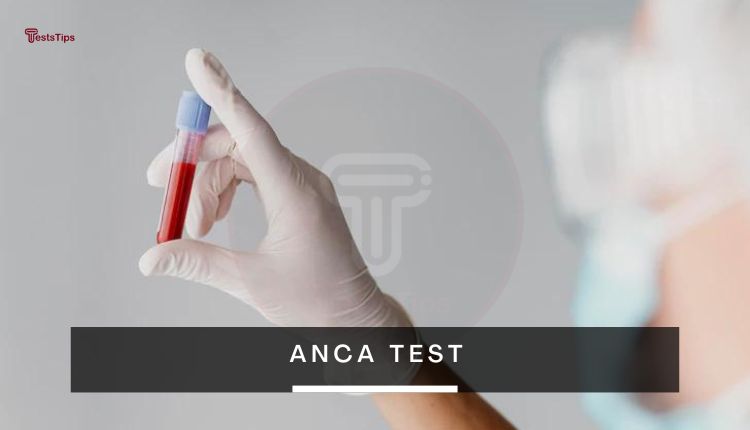ANCA Test – Anti neutrophil cytoplasmic antibodies
Anti-Neutrophil Cytoplasmic Antibody Test)
ANCA Test (Anti-Neutrophil Cytoplasmic Antibody Test) detects autoantibodies in the blood that can indicate certain autoimmune diseases find out more here.

Table of Contents
ANCA Test or Anti Neutrophil Cytoplasmic Antibody Test is a blood test used to help diagnose autoimmune diseases such as vasculitis. It detects the presence of an autoantibody known as antineutrophil cytoplasmic antibodies (ANCAs). Knowing your ANCAs level can help doctors determine the best possible treatments for certain conditions.
What is ANCA?
Anti neutrophil cytoplasmic antibodies (ANCAs) are a group of autoantibodies, mainly of the IgG type, against antigens in the cytoplasm of neutrophils and monocytes lysosomes.
They are found in the serum of over 90% of patients with antineutrophil cytoplasmic antibody-associated vasculitis (granulomatosis with polyangiitis and microscopic polyangiitis). ANCA testing is an important tool in the diagnosis and management of these diseases.
When evaluating patients suspected of having antineutrophil cytoplasmic antibody-associated vasculitis (granulomatosis with polyangiitis and microscopic polyangiitis), ANCA testing is useful in distinguishing between these two diseases. ANCA testing also allows for the early diagnosis of vasculitic complications, such as renal failure, which can occur in both diseases.
What is the ANCA Test?
The anti-neutrophil cytoplasmic antibody test (ANCA test) is a blood test that detects proteins your immune system makes to fight germs. This test is used to diagnose a number of autoimmune disorders, but is particularly associated with systemic vasculitis, so called ANCA-associated syndromes.
The ANCA blood test is used to detect Antineutrophil cytoplasmic autoantibodies which (ANCA) are a serological marker associated with vasculitis and other diseases. The two most common ANCA testing methods are the indirect immunofluorescence assay (IIF) and the immunoassay, such as enzyme-linked immunosorbent assay (ELISA).
What are the Different Types of ANCA Tests?
There are two types of ANCA. Each one targets a different protein within white blood cells:
- pANCA, which targets the protein MPO (myeloperoxidase).
- cANCA, which targets the protein PR3 (proteinase 3).
The test can detect either one or both types of antibodies. This can assist your doctor in diagnosing and treating your condition.
There are two main types of ANCA testing, namely:
- The indirect immunofluorescence assay (IIF)
- The immunoassay, such as enzyme-linked immunosorbent assay (ELISA).
The indirect immunofluorescence assay (IIF) is a more sensitive test and can be used to detect lower levels of antineutrophil cytoplasmic antibodies (ANCA). However, it is less specific, meaning that it can detect antibodies against other types of human cells as well.
The immunoassay, such as the enzyme-linked immunosorbent assay (ELISA), is a more specific test. It can be used to directly measure the level of antineutrophil cytoplasmic antibodies (ANCA) in a sample. However, this test is more expensive and requires more time to obtain results.
Both tests have their own advantages and disadvantages. For example, the IIF is less specific but can be used to detect lower levels of ANCA. On the other hand, the ELISA is more specific but more expensive and takes longer to get results.
It is important to choose the right test for your individual situation. If you are not sure which test to choose, your doctor may recommend using both tests in order to get a more complete picture of your condition.
What are the Benefits of ANCA Tests?
Anti-neutrophil cytoplasmic antibodies (ANCA) tests are valuable in the diagnosis of certain types of vasculitis. They can help to identify patients who may have a more serious condition, such as ulcerative colitis (UC) or Crohn’s disease (CrD). Additionally, ANCA tests can be used to stratify UC patients and to differentiate them from Crohn’s patients.
There are a few benefits to having ANCA tests performed, including the following:
- Increased accuracy in the diagnosis of vasculitis
- Ability to differentiate between different types of vasculitis
- Ability to determine which patients may require more aggressive treatment
- Ability to track the progression of vasculitis over time.
The Procedure for an ANCA Test

There are 2 main techniques used to identify antineutrophil cytoplasmic antibodies (ANCA). Indirect immunofluorescence uses ethanol-fixed neutrophils to demonstrate a perinuclear (p-nucleus) reaction. This technique is usually used to check for the presence of ANCA in patients with small vessel vasculitis (SVVC), though it can also be used to screen patients with other types of vasculitis.
The serum from your blood sample is mixed with the neutrophils on the slide, and the reaction is then observed. In order to assure appropriate anti-neutrophil cytoplasmic antibody (ANCA)-test usage to support the diagnosis of ANCA-associated vasculitis (AAV), standardization and quality control procedures are important.
“Related: Microalbumin Creatinine Ratio. Results and test preparations“
Results interpretations
If your results were negative, your symptoms are most likely not the result of autoimmune vasculitis.
If your results were positive, you could be suffering from autoimmune vasculitis. It can also indicate whether or not cANCAs or pANCAs were discovered. This can help you figure out what kind of vasculitis you have.
Whatever type of antibodies were discovered, you may require a biopsy to confirm the diagnosis. A biopsy is a procedure in which a small sample of tissue or cells is removed for testing. In addition, your doctor may order additional tests to determine the level of ANCA in your blood.
If you are currently being treated for autoimmune vasculitis, the results of your tests may reveal whether or not your treatment is effective.
Related tests
- Blood Differential
- ANA (Antinuclear Antibody) Test
- Erythrocyte Sedimentation Rate (ESR)
- Protein in Urine
ANCA test is important in the diagnostic work-up of patients with small-vessel vasculitis, and can help confirm the diagnosis and determine the severity of the condition. In combination with other tests, ANCA testing can help identify which type of vasculitis you have and help plan the best treatment.
